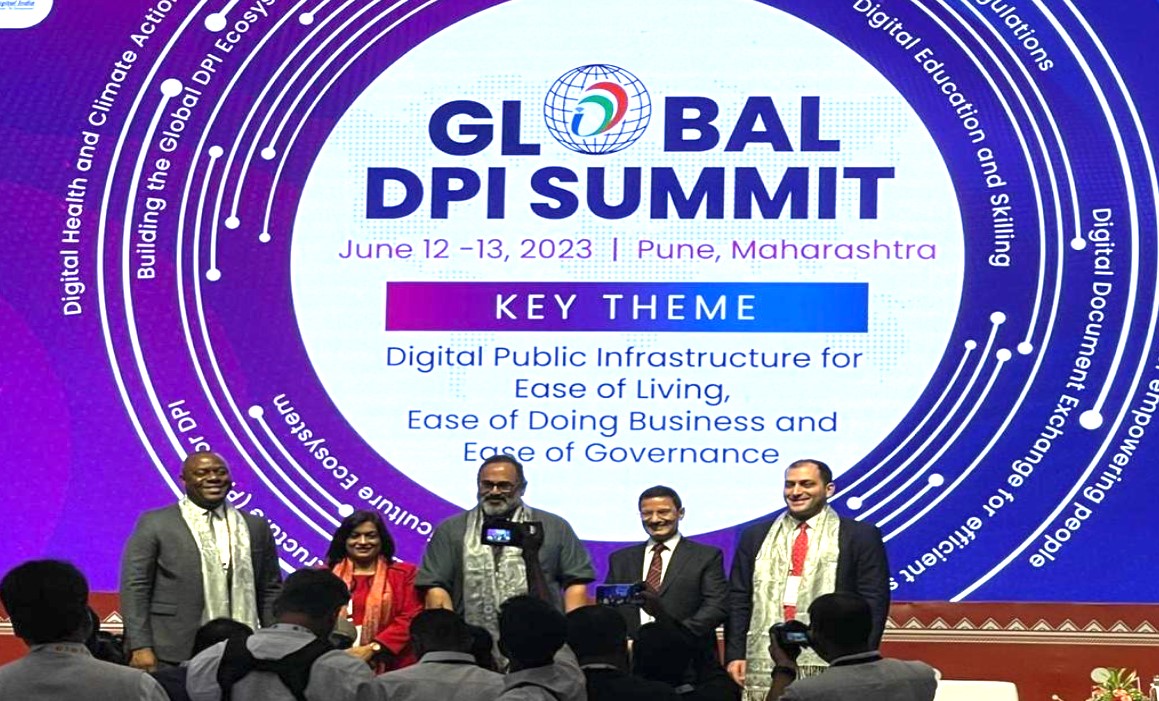- Courses
- GS Full Course 1 Year
- GS Full Course 2 Year
- GS Full Course 3 Year
- GS Full Course Till Selection
- MEP (Mains Enrichment Programme) Data, Facts
- Essay Target – 150+ Marks
- Online Program
- GS Recorded Course
- NCERT- First Ladder
- Polity
- Geography
- Economy
- Ancient, Medieval and Art & Culture AMAC
- Modern India, Post Independence & World History
- Environment
- Governance
- Science & Technology
- International Relations and Internal Security
- Disaster Management
- Ethics
- Current Affairs
- Indian Society and Social Issue
- CSAT
- 5 LAYERED ARJUNA Mentorship
- Public Administration Optional
- ABOUT US
- OUR TOPPERS
- TEST SERIES
- FREE STUDY MATERIAL
- VIDEOS
- CONTACT US
Global DPI (Digital Public Infrastructure) Summit
Global DPI (Digital Public Infrastructure) Summit
14-06-2023


Latest Context
The Global DPI (Digital Public Infrastructure) Summit and Exhibition opened in Pune, Maharashtra, marking the start of the third meeting of the G20 Digital Economy Working Group (DEWG).
- The discussion covered DPI's common tenets and design features, such as open standards, collaborations, interoperability, and cost.
- The One Future partnership partnership, which would enable like-minded nations to employ technology to better people's lives, was also proposed by India.
- In 2017, as part of Germany's G20 presidency, the DEWG, formerly known as the DETF, was established with the goal of advancing the implementation of a safe, connected, and inclusive digital economy.
- The DEWG is essential in influencing the global policy debate in the digital sphere since the global digital economy is projected to be worth USD 11 trillion and is expected to reach USD 23 trillion by 2025.
Key Highlights of the Summit
- Laying the Foundation for DPI Developments:
- It was emphasised how important India is as a test case for DPI implementation and digital transformation.
- In order to share its successful digital solutions that have been scaled up through the India Stack, India signed MoUs with Armenia, Sierra Leone, and Suriname.
- Digital Identities for Empowering People:
- The session focused on how digital identity serves as the cornerstone for both social cohesiveness and national objectives.
- Various implementation approaches, including centralised, federated, and decentralised ones, were discussed.
- Aadhaar in India and PhilSys in the Philippines were singled out as noteworthy examples.
- Financial Inclusion and Digital Payments:
- The discussion focused on how DPI enables quick and inclusive digital payments.
- Topics discussed included user onboarding expenses, settlement kinds, risk management, and bridging the financial gap with DPI.
- DPI for Legal Systems and Regulations:
- The use of DPI in court systems was covered at the session.
- E-court systems, e-filing, paperless courts, live streaming, and the necessity of suitable institutions and laws to build faith in DPI-powered justice systems were among the subjects discussed.
- PKI Mutual Recognisance Framework in Draft:
- The Ministry of Electronics & IT, Government of India, has issued the Draftt Public Key Infrastructure (PKI) Mutual Recognition Framework in an effort to take the lead on the topic of implementation and acceptance of India's DPI outside of the country's boundaries.
What is One Future Alliance?
- A group of nations will create an alliance in order to use technology to enhance peoples' lives. In order to promote social, economic, and sustainable development, it aspires to make it possible for like-minded nations to work together and employ technology.
- In order to encourage nations to create and adapt these solutions to their unique needs, the alliance aims to expand on the open-source configurable stacks that are currently available.
- The alliance strives to implement and promote Digital Public Infrastructure (DPI) while encouraging collaboration in fields including cybersecurity and digital skilling. It recognises the dynamic nature of technology, particularly the strength of artificial intelligence and multilingualism.
Facts about Digital Public Infrastructure
- DPI refers to blocks or platforms such as digital identification, payment infrastructure and data exchange solutions that help countries deliver essential services to their people, empowering citizens and improving lives by enabling digital inclusion.
- The movement of people, money, and information is mediated through DPIs. The movement of individuals through a digital ID system comes first. Second, the movement of funds via a real-time, quick payment method. Thirdly, the flow of personal data through a consent-based data sharing system to fully realise the advantages of DPIs and give the citizen a practical means of data control.
- The establishment of a successful DPI ecosystem depends on these three sets.
- Each DPI layer meets an obvious requirement and creates a lot of value for many industries.
- The three fundamental DPIs—Digital identification (Aadhar), Real-time rapid payment (UPI), and Account Aggregator built on the Data Empowerment Protection Architecture (DEPA)—were all developed for the first time by India through India Stack.
- Through the use of a third-party organisation known as a Consent Manager, DEPA develops a digital framework that enables users to disclose their data on their own terms.

Q1. Consider the following statements: (2018)
- Aadhaar card can be used as a proof of citizenship or domicile.
- Once issued, Aadhaar number cannot be deactivated or omitted by the Issuing Authority.
Which of the statements given above is/are correct?
(a) 1 only
(b) 2 only
(c) Both 1 and 2
(d) Neither 1 nor 2
Ans: (d)
Q2. In India, the term “Public Key Infrastructure” is used in the context of (2020)
(a) Digital security infrastructure
(b) Food security infrastructure
(c) Health care and education infrastructure
(d) Telecommunication and transportation infrastructure
Ans: (a)



